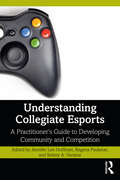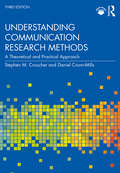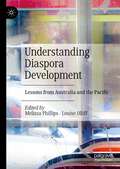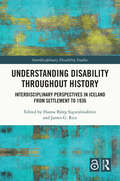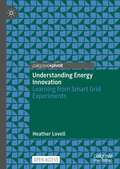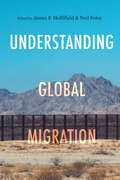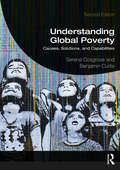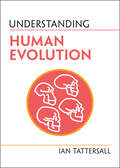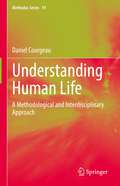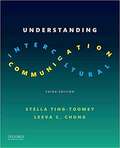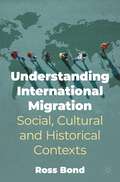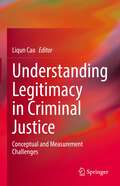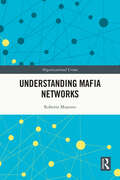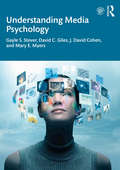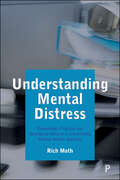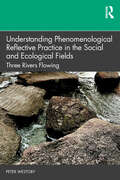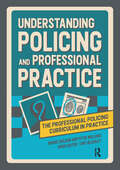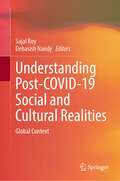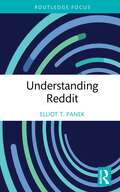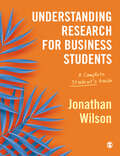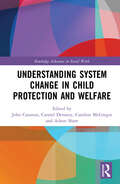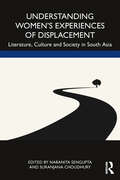- Table View
- List View
Understanding Collegiate Esports: A Practitioner’s Guide to Developing Community and Competition
by Jennifer Lee Hoffman, Regena Pauketat and Kelsey A. VarzeasAs esports is one of the new and rapidly growing sports programs at the collegiate level, today’s campus leaders are increasingly asked to navigate the complexity of esports. This practical volume helps higher education professionals understand the expanding role of collegiate esports, describing the ecosystem of college esports and the experience for college players, as well as the connections between gaming and career preparation. Chapter authors offer an overview and practical look at the main structures and issues facing collegiate esports programs, athletes, and administrators. Chapters address the needs of the campus gaming community, building gender and racial inclusivity, athlete health, amateurism and the esports athlete, the role of the technology industry, governance, career paths, and coaching. This cutting-edge volume offers information to support campus leaders and practitioners in building and expanding collegiate esports programs in the quickly growing and changing aspects of both online and face-to-face campus communities.
Understanding Communication Research Methods: A Theoretical and Practical Approach
by Stephen M. Croucher Daniel Cronn-MillsUsing an engaging how-to approach that draws from scholarship, real life, and popular culture, this textbook, now in its third edition, offers students practical reasons why they should care about research methods and offers a practical guide to actually conducting research themselves. Examining quantitative, qualitative, and critical research methods, this new edition helps undergraduate students better grasp the theoretical and practical uses of method by clearly illustrating practical applications. The book features all the main research traditions within communication including online methods and provides level-appropriate applications of the methods through theoretical and practical examples and exercises, including sample student papers that demonstrate research methods in action. This third edition also includes additional chapters on experimental design and methods of performance, as well as brand new case studies throughout. This textbook is perfect for students and scholars using critical, cultural, interpretive, qualitative, quantitative, and positivist research methods, as well as students of communication studies more generally. It also offers dedicated student resources on the Routledge.com book page and instructor resources at https://routledgetextbooks.com/textbooks/instructor_downloads/. These include links, videos, outlines and activities, recommended readings, test questions, and more.
Understanding Diaspora Development: Lessons from Australia and the Pacific
by Melissa Phillips Louise OlliffThis book brings together new research that engages with the concept of diaspora from a uniquely Australian perspective and provides a timely contribution to the development of research-informed policy, both in the Australian context and more broadly. It builds on the understanding of the complex drivers and domains of diaspora transnationalism and its implications for countries and people striving to develop human capabilities in a globally interconnected but also fractured world. The chapters showcase a wide range of diaspora experiences from culturally and linguistically diverse communities in Australia. This work demonstrates the usefulness of diaspora as a concept to explore the experiences of migrant and refugee communities in Australia and the Pacific and further understanding on the peacebuilding, conflict, economic, humanitarian and political engagements of diaspora communities globally. The insights and findings from the breadth of research featured shed light on broader debates about diasporas, migration and development, and transnationalism.
Understanding Disability Throughout History: Interdisciplinary Perspectives in Iceland from Settlement to 1936 (Interdisciplinary Disability Studies)
by Hanna Björg Sigurjónsdóttir James G. RiceUnderstanding Disability Throughout History explores seldom-heard voices from the past by studying the hidden lives of disabled people before the concept of disability existed culturally, socially and administratively. The book focuses on Iceland from the Age of Settlement, traditionally considered to have taken place from 874 to 930, until the 1936 Law on Social Security (Lög um almannatryggingar), which is the first time that disabled people were referenced in Iceland as a legal or administrative category. Data sources analysed in the project represent a broad range of materials that are not often featured in the study of disability, such as bone collections, medieval literature and census data from the early modern era, archaeological remains, historical archives, folktales and legends, personal narratives and museum displays. The ten chapters include contributions from multidisciplinary team of experts working in the fields of Disability Studies, History, Archaeology, Medieval Icelandic Literature, Folklore and Ethnology, Anthropology, Museum Studies, and Archival Sciences, along with a collection of post-doctoral and graduate students. The volume will be of interest to all scholars and students of disability studies, history, medieval studies, ethnology, folklore, and archaeology.
Understanding Energy Innovation: Learning from Smart Grid Experiments
by Heather LovellThis open access book uses smart grids to explore and better understand energy innovation, from a social science perspective. Understanding Energy Innovation has four core themes—networks, nodes, narratives and nostalgia—and each chapter tackles a theme, using case studies from Australia and Europe. Energy innovation is currently occurring at a rapid pace, in response to a host of problems including climate change, high energy prices, and unreliable supply. Understanding Energy Innovation provides ways to think about and plan for energy sector reform and innovation, drawing on core ideas from social and innovation theory, and centred on smart grids as a case study. These academic ideas are written about in an accessible way, recognising that a diversity of people have an interest in energy innovation generally, and smart grids more specifically, and would like to find out more about ways of understanding energy innovation that integrate the social and the political.
Understanding Global Migration
by James F. Hollifield and Neil FoleyUnderstanding Global Migration offers scholars a groundbreaking account of emerging migration states around the globe, especially in the Global South. Leading scholars of migration have collaborated to provide a birds-eye view of migration interdependence. Understanding Global Migration proposes a new typology of migration states, identifying multiple ideal types beyond the classical liberal type. Much of the world's migration has been to countries in Asia, Africa, the Middle East, and South America. The authors assembled here account for diverse histories of colonialism, development, and identity in shaping migration policy. This book provides a truly global look at the dilemmas of migration governance: Will migration be destabilizing, or will it lead to greater openness and human development? The answer depends on the capacity of states to manage migration, especially their willingness to respect the rights of the ever-growing portion of the world's population that is on the move.
Understanding Global Poverty: Causes, Solutions, and Capabilities
by Serena Cosgrove Benjamin CurtisUnderstanding Global Poverty introduces students to the study and analysis of poverty, helping them to understand why it is pervasive across human societies, and how it can be reduced through proven policy solutions. The book uses the capabilities and human development approach to foreground the human aspects of poverty, keeping the voices, experiences, and needs of the world’s poor central to the analysis. Starting with definitions and measurement, the book goes on to explore the causes of poverty and how poverty reduction programs and policy have responded in practice. The book also reflects on the ethics of why we should work to reduce poverty and what actions readers themselves can take. This new edition has been revised and updated throughout, featuring: • a new chapter on migration and refugees • additional international examples, including material on Mexico, Covid-19 in global perspective, and South–South development initiatives • information on careers in international development • insights into how various forms of social difference, including race, ethnicity, social class, gender, and sexuality relate to poverty Fully interdisciplinary in approach, the book is also supplemented with case studies, discussion questions, and further reading suggestions in order to support learning. Perfect as an introductory textbook for students across sociology, global development, political science, anthropology, public health, and economics, Understanding Global Poverty will also be a valuable resource to policy makers and development practitioners.
Understanding Homicide
by Fiona BrookmanIn this engaging and accessible book, Brookman draws upon several decades of her own research on homicide and violence, including ethnographic research on homicide investigation in the UK and USA and interviews with violent offenders, in order to unravel the characteristics and causes of homicide, how police and forensic scientists investigate it and how it can be prevented. Synthesising bespoke new analysis of the Home Office Homicide Index with case studies of homicides and international debate and literature, this comprehensive textbook will be a valuable resource for students studying homicide, violence, its investigation and responses to it, as well as researchers and practitioners interested in homicide and violence.
Understanding Homicide
by Fiona BrookmanIn this engaging and accessible book, Brookman draws upon several decades of her own research on homicide and violence, including ethnographic research on homicide investigation in the UK and USA and interviews with violent offenders, in order to unravel the characteristics and causes of homicide, how police and forensic scientists investigate it and how it can be prevented. Synthesising bespoke new analysis of the Home Office Homicide Index with case studies of homicides and international debate and literature, this comprehensive textbook will be a valuable resource for students studying homicide, violence, its investigation and responses to it, as well as researchers and practitioners interested in homicide and violence.
Understanding Human Evolution (Understanding Life)
by Ian TattersallHuman life, and how we came to be, is one of the greatest scientific and philosophical questions of our time. This compact and accessible book presents a modern view of human evolution. Written by a leading authority, it lucidly and engagingly explains not only the evolutionary process, but the technologies currently used to unravel the evolutionary past and emergence of Homo sapiens. By separating the history of palaeoanthropology from current interpretation of the human fossil record, it lays numerous misconceptions to rest, and demonstrates that human evolution has been far from the linear struggle from primitiveness to perfection that we've been led to believe. It also presents a coherent scenario for how Homo sapiens contrived to cross a formidable cognitive barrier to become an extraordinary and unprecedented thinking creature. Elegantly illustrated, Understanding Human Evolution is for anyone interested in the complex and tangled story of how we came to be.
Understanding Human Life: A Methodological and Interdisciplinary Approach (Methodos Series #19)
by Daniel CourgeauThis book addresses the challenge of understanding human life. It compares our life experience with the attempts to grasp it by astrologers, eugenicists, psychologists, neuroscientists, social scientists, and philosophers. The main opposition among these specialties lies between understanding and misunderstanding. The book also addresses the central methodological difficulty of capturing a human life. It is first examined how certain approaches may lead to a misunderstanding of human life. The book contrasts the example of astrology—an accepted practice in ancient civilizations, but now classified among the pseudosciences—with astronomy, a full-fledged science since Galileo’s time. Another, more recent approach regards human life as predetermined by genes: the methods used by eugenicists, and later by political regimes under the name of hereditarianism, came to compete with genetics. A broader analysis shows how astrology and eugenicism are not truly scientific approaches. Next, the book looks at the ways of capturing an imaginary or real human life story. A comprehensive approach will try to fully understand their complexity, while a more explanatory approach considers only certain specific phenomena of human life. For example, demography studies only births, deaths, and migration. Another crucial factor in the collection of life histories is memory and its transmission. Psychology and psychoanalysis have developed different schools to try to explain them. The book concludes with a detailed discussion of the concepts and tools that have been proposed in more recent times for understanding the various aspects of life stories: mechanisms, systems, hermeneutics, and autonomy.
Understanding Intercultural Communication
by Stella Ting-Toomey Leeva ChungUnderstanding Intercultural Communication, 3rd Edition (UIC3) emphasizes a perspective that integrates intersectional identity complexity with a strong values orientation in shaping intercultural contact. We address contemporary issues such as the important roles and effects of technology in our everyday intercultural lives. This is an introductory book designed for undergraduate students, teachers, and practitioners searching for a user-friendly textbook on the fundamentals of intercultural communication. With the lens of flexible intercultural communication, we thread through an abundance of intercultural material with a very practical theme. By integrating current empirical research with lively intercultural examples, the authors ask thought-provoking questions and pose ethical dilemmas for students to ponder.
Understanding International Migration: Social, Cultural and Historical Contexts
by Ross BondUniquely informed by a sociological perspective, this major new textbook introduces the underlying origins and consequences of international migration, placing individuals within a broader social, cultural and historical context. This comprehensive introduction analyses international migration and its effects on those who migrate, their families, and their places of origin and destination. Drawing on illustrative examples from around the world, the book covers the major theories concerning the origins of international migration and the manner, degree and consequences of migrants’ incorporation into the societies to which they move. It also includes in-depth discussion of how international migration is relevant to key issues – gender, the family, and religion; the so-called refugee ‘crisis’ in much of the developed world; and offers insights throughout into cutting-edge research from emotions and lifestyle migration to the proliferation of digital communication technologies. This text expertly offers students the necessary skills to unpack common myths that are used to inform policy and media discourse, including abstract distinctions between ‘refugee’ and ‘economic migrant’, the complex and ambiguous nature of migrant national identity, and that while many richer countries of the world are characterized by a perceived refugee ‘crisis’, it is in fact poorer and developing countries that see the vast majority of the world’s refugees and displaced persons.
Understanding Legitimacy in Criminal Justice: Conceptual and Measurement Challenges
by Liqun CaoThis book updates the recent quantitative and qualitative, empirical and theoretical literature on legitimacy, focusing on how it can be measured in diversified research environments. Highlighting the different measurements and the critique surrounding them, this volume is a coherent and systematic guide to theory on legitimacy. This book is divided into three sections: Theoretical framework Legitimacy and its measures Legitimacy International Within these three parts, individual chapters are expected to provide in-depth analysis of core topics, including development, measurement, and cultural disparities, and collectively represent a comprehensive review of legitimacy in theory and in methodology in the global context. The book is ideal for researchers and graduate criminology and criminal justice students.
Understanding Mafia Networks (Organizational Crime)
by Roberto MusottoThe Sicilian Mafia is the most famous criminal organisation in the world. While its own code of honour, rustic chivalry and violence methods have been adopted by other illicit groups, very little is known about how the Mafia, Cosa Nostra, is actually organised and embedded in its territory. Who runs the day-to-day operations? What does it take for a Mafioso to raise the ranks and become a boss? How can the organisation protect itself and re-group after arrests? This book explores for the first time the structure of this criminal organisation through the lens of spatial and social network analysis and answers these questions. This is done by looking at the relationships of 176 members of the organisation that have been recently involved in building the Cupola, the highest ruling and judicial body in the organisation. Starting from the arrest warrant that uncovered this criminal restructuring, a method and several alternatives are offered, explained and commented on how to analyse and visualise criminal networks. The book confirms the assumption that the Sicilian Mafia is a criminal organisation that is deeply rooted in its territory. Mafiosi live, work and interact only in the remit of their own neighbourhood. Bosses are evasive, even to their own affiliates, and mid-level members are in charge of keeping the whole network operational. This book is particularly useful to students, researchers and law enforcement agencies that look at new ways to understand and disrupt the operations and structure of criminal organisations around the world.
Understanding Media Psychology
by David C. Giles Gayle S. Stever J. David Cohen Mary E. MyersUnderstanding Media Psychology is the perfect introductory textbook to the growing field of media psychology and its importance in society, summarizing key concepts and theories to provide an overview of topics in the field. Media is present in almost every area of life today, and is an area of study that will only increase in importance as the world becomes ever more interconnected. Written by a team of expert authors, this book will help readers to understand the structures, influences, and theories around media psychology. Covering core areas such as positive media psychology, the effects of gaming, violence, advertising, and pornography, the authors critically engage with contemporary discussions around propaganda, fake news, deepfakes, and the ways media have informed the COVID-19 pandemic. Particular care is also given to addressing the interaction between issues of social justice and the media, as well as the effects media has on both the members of marginalized groups and the way those groups are perceived. A final chapter addresses the nature of the field moving forward, and how it will continue to interact with closely related areas of study. Containing a range of pedagogical features throughout to aid teaching and student learning, including vocabulary and key terms, discussion questions, and boxed examples, this is an essential resource for media psychology courses at the undergraduate and introductory master’s level globally.
Understanding Mental Distress: Knowledge, Practice and Neoliberal Reform in Community Mental Health Services
by Rich MothIn this timely analysis, Rich Moth assesses mental health services in a period of major change. Based on extended fieldwork in community mental health services, he explores the many impacts of policy reform, marketisation and austerity on NHS mental health provision, and positions developments in the contexts of neoliberalism and an increased emphasis on individual responsibility. Firmly rooted in the lived experiences of people using mental health services and the everyday practices of social workers, nurses and psychiatrists, he develops a stimulating perspective on how mental distress is understood and responded to within these settings.
Understanding Phenomenological Reflective Practice in the Social and Ecological Fields: Three Rivers Flowing
by Peter WestobyThis book introduces social practitioners - community development workers, social workers, organisational change facilitators, social, ecological, cultural and political activists - to a phenomenological tradition of reflective practice. Critiquing reductionist, linear and ossified thinking in the social and ecological fields, the book offers an exciting new alternative that is honouring of the uncertainty of all living and therefore emergent social processes. Linking phenomenology and Goethe’s ‘delicate empiricism’, the book challenges practitioners to observe and work with living processes. As such, the book charts two stories, two inquiries. One personal and the other social. The first is the personal phenomenological inquiry into the author’s own practice, a search to make sense of the nuanced and subtle practice that he brings to the social world. The second journey is the inquiry into how this social practice, shaped as it is by a confluence of three rivers – dialogue and community, soul and depth psychology, Goethe and ‘delicate activism’, along with other thinkers on ‘observation’ and ‘aliveness’ – can be understood in the context of a wider phenomenological reflective practice. This second journey draws on years of experience and research in Brazil, South Africa, Australia, New Zealand and parts of Europe. Presenting a philosophical, personal and practical analysis, it offers a new approach to observation and action, while working with aliveness and complexity within the social and ecological fields. It will be of interest to all scholars and students of social work and community development and particularly courses on social complexity.
Understanding Policing and Professional Practice (The Professional Policing Curriculum in Practice)
by Peter Williams Barrie SheldonThis book outlines the foundations for understanding modern policing. It is an essential introduction for all policing students and trainee police officers to the underpinning aspects of the profession, providing a clear understanding of how the police service is currently organised and how it fits into the wider criminal justice system. Students are encouraged to think critically and reflect upon core concepts such as policing by consent, police accountability, governance and professional standards, and it examines the challenges of policing an increasingly global, technical and diverse world.The Professional Policing Curriculum in Practice is a new series of books that match the requirements of the new pre-join policing qualifications. The texts reflect modern policing, are up-to-date and relevant, and grounded in practice. They reflect the challenges faced by new students, linking theory to real-life operational practice, while addressing critical thinking and other academic skills needed for degree-level study.
Understanding Post-COVID-19 Social and Cultural Realities: Global Context
by Sajal Roy Debasish NandyThis book concentrates on the changing patterns of work and global social order as a result of COVID-19. It scrutinizes these changes in order to point out the possible reasons for these changes following COVID-19. It sheds light on the differences between the condition of underdeveloped and developed countries, focusing on how they struggle to find ways of coping. The pandemic has changed the global social order. It has an impact on every aspect of life around the globe, from individual relationships to institutional operations and international collaborations. Societies are endeavoring to protect themselves despite severe restrictions, while the pandemic continues to upset family relations and overturn governance. COVID-19 has made it clearer than ever before that where many strains on the social sector occur, the current global system, with its interconnectedness and vulnerabilities, is under threat. Due to the changing patterns of economic and societal elements caused by COVID-19, further research is urgently needed to analyze these changing trends. The book portrays what work and the global social order will look like in the future. It is essential reading for anyone interested in these changes and the pst-COVID-19 reality.
Understanding Reddit (Routledge Focus on Digital Media and Culture)
by Elliot T. PanekThis book offers a comprehensive scholarly overview of Reddit, one of the most popular and least studied social platforms of the early 21st century. The book inspires new ways of thinking about Reddit, considering it from multiple perspectives: through a historical lens, as a site where identity is forged, as a democracy, as a community, and as a news aggregator and distributor. By bringing theories from computer-mediated communication, communication studies, and sociology to bear on original, large-scale observational analyses of Reddit’s communities, this book provides a uniquely comprehensive overview of the platform’s first 15 years. Understanding Reddit will help us make sense of how rapidly growing communities function in an era of mass online anonymity. Serving both as a primer on how social behavior on Reddit plays out, and as a way of locating it within multiple theoretical traditions, the book will offer important insights to scholars and students in the disciplines of communication, media studies, information science, internet and emerging media studies, and sociology.
Understanding Research for Business Students: A Complete Student′s Guide
by Jonathan WilsonAre you conducting business research for the first time and aren′t sure where to begin? This book gives you everything you need to successfully complete your research project. From choosing a direction for your research and considering ethics to data collection and presenting your results, it offers straightforward guidance on every step of the research process. Covering topics such as social media research, group working and how to research your own organisation, it provides a thorough view of research for business and management students. The book: Enables you visualise how each stage of research links to the next, and makes sure you don′t miss a step with a handy ′Research Project Wheel′ Empowers you to increase your employability and develop transferable skills, such as proposal writing and data analysis Provides student research examples that show common challenges you might face - and how to address them. Key features include research snapshots, offering short how-to examples for doing real research, and concept cartoons, which put forward different views about research so you can broaden your knowledge. It also has end-of-chapter questions, online multiple choice questions and Kahoot! questions so you can test your understanding. Guiding you through working with and understanding both primary and secondary data, this book is the perfect companion for any undergraduate conducting a business and management research project.
Understanding Research for Business Students: A Complete Student′s Guide
by Jonathan WilsonAre you conducting business research for the first time and aren′t sure where to begin? This book gives you everything you need to successfully complete your research project. From choosing a direction for your research and considering ethics to data collection and presenting your results, it offers straightforward guidance on every step of the research process. Covering topics such as social media research, group working and how to research your own organisation, it provides a thorough view of research for business and management students. The book: Enables you visualise how each stage of research links to the next, and makes sure you don′t miss a step with a handy ′Research Project Wheel′ Empowers you to increase your employability and develop transferable skills, such as proposal writing and data analysis Provides student research examples that show common challenges you might face - and how to address them. Key features include research snapshots, offering short how-to examples for doing real research, and concept cartoons, which put forward different views about research so you can broaden your knowledge. It also has end-of-chapter questions, online multiple choice questions and Kahoot! questions so you can test your understanding. Guiding you through working with and understanding both primary and secondary data, this book is the perfect companion for any undergraduate conducting a business and management research project.
Understanding System Change in Child Protection and Welfare (Routledge Advances in Social Work)
by John Canavan, Carmel Devaney, Caroline McGregor and Aileen ShawThis book provides an account of the experience of a multifaceted system-change programme to strengthen the capacity of Ireland’s statutory child protection and welfare agency in the areas of prevention, early intervention and family support. Many jurisdictions globally are involved in system change processes focused on increasing investment in services that seek to prevent children’s entry into child protection and welfare systems, through early intervention, greater support to families, and an increased emphasis on rights and participation. Based on a four-year in-depth study by a team of University-based researchers, this text adds to the emerging knowledge-base on developing, implementing and evaluating system change in child protection and welfare. Study methodological approaches were wide ranging and involved a number of key stakeholders including children, parents, social workers and social care workers, service managers, agency leaders and policy makers. Since the change process involved an agency-university partnership encompassing design, technical support and evaluation, the book also contributes to understandings of the potential and limits of such partnerships in the child protection and welfare field. Uniquely, the book gives voice to the experience of both agency personnel and academic in the accounts provided. It will be of interest to all scholars, students and practitioners in the areas of child protection and welfare.
Understanding Women’s Experiences of Displacement: Literature, Culture and Society in South Asia
by Nabanita Sengupta and Suranjana ChoudhuryThe South Asian region has been especially prone to mass displacement and relocations owing to its varied geographical settings as well as socio-political factors. This book examines the women’s perspective on issues related to displacement, loss, conflict, and rehabilitation. It maps the diverse engagements with women’s experiences of displacement in the South Asian region through a nuanced examination of unexplored literary narratives, life writing and memoirs, cultural discourses, and social practices. The book explores themes like sexuality and the female body, women and the national identity, violence against women in Indian Partition narratives, and stories of exile in real life and fairy tales. It also offers an understanding of the ruptures created by dislocation and exile in memory, identity, and culture by analyzing the spaces occupied by displaced women and their lived experiences. The volume looks at the multiplicity of reasons behind women’s displacement and offers a wider perspective on the intersections between gender, migration, and marginalization. This book will be useful for scholars and researchers of cultural studies, literature, gender studies, conflict studies, development studies, South Asian studies, refugee studies, diaspora studies, and sociology.
